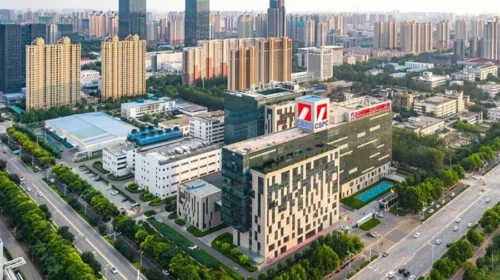Innogen Pharma jostles for a slice of the weight-loss market

The developer of diabetes and anti-obesity drugs has applied for a Hong Kong IPO as it prepares for battle in a crowded arena
Key Takeaways:
- Innogen is expected to launch its first commercial product in the first half of 2025
- The company was founded by a leading figure in Chinese diabetes research
By Lee Shih Ta
Just over a century ago, a Canadian surgeon and his team at Toronto University identified insulin as a treatment for diabetes. Now a second wave of game-changing drugs is sweeping the market in the fight against rising rates of obesity and related diseases.
The work of Frederick Banting and Charles Best in the 1920s led to life-saving drugs for type 1 diabetes, an innate immune disorder. Ozempic and other GLP-1 drugs that have emerged in the past few years target insulin resistance in a second form of diabetes associated with excessive weight or inactive lifestyles.
The latest breakthrough has encouraged Chinese companies to work on their own glucagon-like peptide drugs, hoping to tap into the vast weight management market with the help of investor capital.
Two firms in the field of diabetes and obesity drugs are now knocking on the door of the Hong Kong Stock Exchange. Guangzhou Innogen Pharmaceutical Group Co. Ltd. recently applied to list on the main board, sponsored by CITIC Securities and CICC, shortly after an IPO application by China’s PegBio.
Innogen’s pitch to investors focuses on a drug described in the prospectus as the first humanized long-acting GLP-1 receptor agonist to have been developed in Asia. Innogen applied last year to China’s medical regulators for a biologics license and expects the drug, efsubaglutide alfa, to hit the market in the first half of 2025, shortly after PegBio is due to launch its product, PB-119.
The Innogen drug is designed to be administered on a weekly basis to combat type 2 diabetes and obesity. Unlike the PegBio product, it is derived from a humanized cell line, offering sustained control of blood sugar with reduced risks of an adverse immune response, the company said.
As it stands, 10 GLP-1 drugs have gained international approval for treating type 2 diabetes, of which only three are in the same humanized category, namely dulaglutide and tirzepatide from Eli Lilly (LLY.US) and semaglutide from Novo Nordisk (NVO.US). Those three drugs together account for around 86% of the global market for GLP-1 diabetes drugs, posing stiff competition to the pending product from China’s Innogen.
Distinguished diabetes leader
Established in 2014 by a Chinese expert in diabetes research, Innogen was a subsidiary of KPC Pharmaceuticals (600422.SH) before launching independent operations in 2020. It also has a connection, through its founder Wang Qing Hua, to the science hub that broke new ground in diabetes research just over 100 years ago. Innogen chairman Wang is a tenured professor at the University of Toronto and serves on the executive board of the world-renowned Banting & Best Diabetes Center.
Wang and his team have developed several novel metabolic drugs, including the product set for launch next year. He holds a controlling stake of 36.07% in Innogen and heads a Chinese national program for innovative drug development.
Aside from its core drug, the company has five other products in the preclinical stage or awaiting trial approval, targeting Alzheimer’s disease, fatty liver disease, obesity, type 1 and type 2 diabetes and other metabolic conditions.
Heavy losses over two years
Without any sales income, Innogen has been burning through its cash. The company lost 300 million yuan ($41.31 million) in 2022, 730 million yuan a year later and 75 million yuan in the first half of 2024, according to data contained in the prospectus. However, expenses have shrunk since efsubaglutide alfa wrapped up Phase Three trials in the first half of 2023, helping to ease some of the financial strain. By the middle of this year, Innogen had cash and cash equivalents of 460 million yuan to fund its ongoing operations.
During the same period, the company spent 270 million yuan, 490 million yuan and 52 million yuan on R&D. Innogen is betting heavily on its mainstay drug, spending 97.6%, 76.4% and 95.4% of the R&D total on efsubaglutide alfa.
Despite the intense rivalry in the weight-loss market, Wang has predicted that the drug, once launched, would generate sales of 1 billion yuan to 3 billion yuan and could even reshape China’s biopharmaceutical industry.
Up to now, Innogen has raised more than 1.51 billion yuan in four rounds of financing, from investors including KIP, Cowin Capital and CICC, to reach a value of 4.65 billion yuan earlier this year.
However, the market for this new class of drugs is quickly becoming crowded. On top of existing products, China has 41 GLP-1 drug candidates for the treatment of diabetes in clinical development, with four already submitted for approval. Innovent Biologics (1801.HK) has also produced a humanized GLP-1 drug, mazdutide, with a weekly dosage routine.
Innogen Pharmaceutical’s product is also undergoing Phase Two trials specifically for use against obesity. But by the time it is approved as a weight-loss treatment, many generic versions of semaglutide may be coming onto the market as the pioneering drug’s anti-obesity patent will expire in 2026.
Innogen could be in a race against time, trying to close the gap on market leaders as new rivals enter the fray.
To subscribe to Bamboo Works weekly free newsletter, click here






